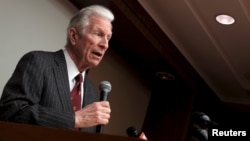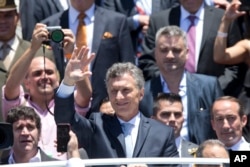Argentina and its main holdout creditors have reached a $4.653 billion agreement in principle to settle a 14-year-old sovereign debt default dispute, a deal that could help the country to return to international capital markets and revive its economy.
The deal, agreed late on Sunday and announced by the New York court-appointed mediator Daniel Pollack on Monday, will see the four largest remaining holdout creditors get paid 75 percent of the amount outstanding on their judgments, including principal and interest.
"This is a giant step forward in this long-running litigation, but not the final step," Pollack said in his statement.
"The agreement in principle is subject to approval by the Congress of Argentina and, specifically, the lifting of the Lock Law and the Sovereign Payment Law, enacted under an earlier administration and which would bar such settlements," he said.
Hedge fund Elliott Management, run by Paul Singer, brought numerous lawsuits against Argentina over the course of the dispute, with hearings before U.S. District Judge Thomas Griesa that were appealed but failed to gain a hearing before the U.S. Supreme Court.
"He was a tough but fair negotiator," Pollack said, adding: "A settlement is, by definition, a compromise and, fortunately, both sides to this epic dispute finally saw the need to compromise, and have done so."
The legal saga involved years of court battles, street protests in Buenos Aires, the seizure of an Argentine naval vessel, and increasingly distorted economic policy as the government tried to avoid settling with the holdout creditors.
"We are pleased to have reached an agreement with Argentina. We are hopeful that the completed negotiations, held under the aegis of Special Master Daniel Pollack, have cleared the way for other plaintiffs to reach satisfactory resolutions as well," Elliott said in a statement Monday.
The remaining largest holdout investors include Aurelius Capital Management, run by former Elliott alumni Mark Brodsky, as well as Davidson Kempner and Bracebridge Capital.
A spokesman for Aurelius declined to comment.
Despite the deal, the main holdouts filed a motion in court Monday urging Griesa not to lift the injunctions because there are many other plaintiffs who have not yet settled the dispute.
The holdouts rejected two prior debt restructurings in 2005 and 2010 that paid out roughly 30 cents on the dollar. The investors who accepted those deals, referred to as exchange bondholders, have not been paid principal and interest on their bonds since a second default in the summer of 2014 resulting in part from New York court decisions.
Intense talks in 2014 with the Fernandez administration ended without a deal and leaving in place an injunction by Griesa that no one would get their principal and interest unless all creditors were paid at the same time.
New beginning for Argentina
A final settlement would open financing options to Argentina's new president as he tries to improve the country's fiscal problems without imposing the kind of sharp spending cuts that have gotten previous Argentine leaders removed from office.
President Mauricio Macri was elected in November promising free-market policies, following eight years of protectionism under Cristina Fernandez who refused to negotiate with hedge funds suing the country over its defaulted bonds.
On Tuesday, Macri will preside over the opening of the 2016 congressional session.
In his speech before lawmakers, he is expected to stress the need for Congress to approve a set of bills clearing the way for a deal with the holdout creditors.
The holdout creditors will likely be paid from the proceeds of a large government bond offering. Under the terms of the agreement the holdout investors said they would not interfere with capital-raising.
Argentina offered $6.5 billion to settle the claims filed in the U.S. courts that amounted to about $9 billion. Other creditors came forward earlier in February accepting the deal.
If the deal with Elliott and the other main holdouts is closed, it would resolve more than 85 percent of the "pari passu" and "me-too" injunctions.
Effect on local bonds
Argentina's internationally traded bonds did not react to Pollack's announcement, according to JPMorgan's Emerging Markets Bond Index +. The price of local bonds traded over the counter in Argentina did not rise or fall on the news.
"Investors had expected this. After the recent steep rise in Argentine bond prices, the announced had been discounted, bringing yields to an average 7.0 percent per year," said Gustavo Ber, a Buenos Aires-based markets consultant.
Given Argentina's absence from the international capital markets, the nation has a low ratio of debt to gross domestic product, making it attractive to investors.
"Under the Macri leadership one can see a path whereby the economic imbalances are tackled and it just becomes a much better investment destination. They'll be attracted by that investment story," said Stuart Culverhouse, head of research at emerging markets brokerage Exotix in London.
"The implied yield at the moment would be about 8.25 percent on the restructured bonds so you could see that coming in to 7 to 7.5 percent. At that level it would be more than fair value so the scope for a big rally from here is probably limited," he added.
So far, the 2033 U.S. dollar-denominated Discount bond is up just 0.042 points in price to bid 117.608, yielding 6.35 percent, according to Thomson Reuters data.
The 2038 Par bond is trading up 0.15 points in price to bid 65.65, yielding 7.05 percent.







